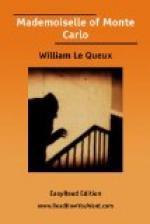“Then you prefer to shield the master criminal of Europe?”
“I have no knowledge that The Sparrow is a criminal.”
“Ask the police of any city in Europe. They will tell you that they have for years been endeavouring to capture Il Passero. Yet so cleverly is his gang organized that never once has he been betrayed. All his friends are so loyal to him.”
“Yet you want me to betray him!”
“You are not a member of the gang of criminals, Miss Ranscomb,” replied Shrimpton.
“Whether I am or not, I refuse to say a word concerning anyone who has been of service to me,” was her stubborn reply. And with that the man from the Criminal Investigation Department had to be content.
Even then, Dorise was not quite certain whether she had misjudged the man who loved her so well, but who was beneath a cloud. She had acted hastily in writing that letter, she felt. Yet she had successfully warned him of his peril, and he had been able to extricate himself from the net spread for him.
It was evident that The Sparrow, who was her friend and Hugh’s, was a most elusive person.
She recollected the White Cavalier at the ball at Nice, and how she had never suspected him to be the deputy of the King of the Underworld—the man whose one hand was gloved.
Within half an hour of the departure of her visitor from Scotland Yard, the maid announced Mr. Sherrard.
Dorise, with a frown, arose from her chair, and a few seconds later faced the man who was her mother’s intimate friend, and who daily forced his unwelcome attentions upon her.
“Your mother told me you would be alone, Dorise,” he said in his forced manner of affected elegance. “So I just dropped in. I hope I’m not worrying you.”
“Oh! not at all,” replied the girl, sealing a letter which she had just written. “Mother has gone to Warwickshire, and I’m going out to lunch with May Petheridge, an old schoolfellow of mine.”
“Oh! Then I won’t keep you,” said the smug lover of Lady Ranscomb’s choice. He was one of those over-dressed fops who haunted the lounges of the Ritz and the Carlton, and who scraped acquaintance with anybody with a title. At tea parties he would refer to Lord This and Lady That as intimate friends, whereas he had only been introduced to them by some fat wife of a fatter profiteer.
Sherrard saw that Dorise’s attitude was one of hostility, but with his superior overbearing manner he pretended not to notice it.
“You were not at Lady Oundle’s the night before last,” he remarked, for want of something better to say. “I went there specially to meet you, Dorise.”
“I hate Lady Oundle’s dances,” was the girl’s reply. “Such a lot of fearful old fogies go there.”
“True, but a lot of your mother’s friends are in her set.”
“I know. But mother always avoids going to her dances if she possibly can. We had a good excuse to be away, as mother was packing.”




